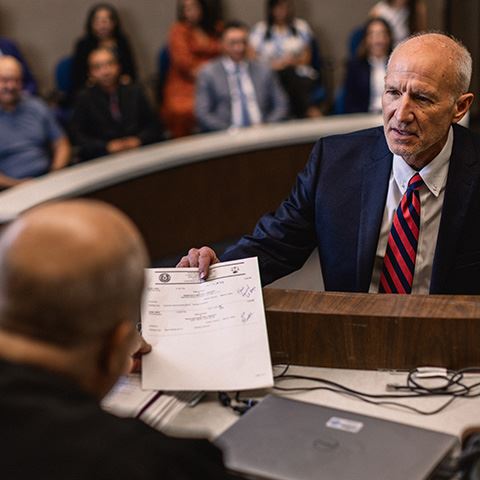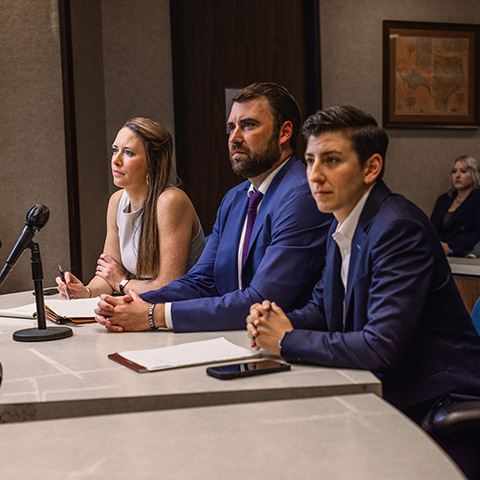Texas Legal Malpractice Attorneys
Fighting for Victims of Corporate Legal Malpractice in Texas
No one, not even legal professionals, is above the law. In our legal system, attorneys are required to adhere to the same statutes, regulations, and ethical standards that apply to everyone else. They are expected to uphold the highest standards of professionalism, good faith, and competence when serving their clients. When attorneys fail to meet these standards, they can, and should, be held accountable.
If you or your business suffered harm due to the negligence of an attorney, Hilliard Law can offer comprehensive legal support. Our experienced Texas legal malpractice lawyers are not afraid to go up against large or prestigious law firms, as we aim to hold the bad actors of our profession accountable for a failure to meet professional and ethical obligations. Whether your case involves business transactions, tax matters, bankruptcy, or real estate, we can provide strategic, results-oriented representation that puts your needs first.
We are ready to put our more than a decade of legal malpractice experience to work for you or your organization. Call (866) 927-3420 or fill out our online contact form today.


Types of Legal Malpractice in Texas
Legal malpractice refers to any conduct by a legal professional that breaches their duty to their client, the legal system, or the profession. A lawyer is negligent in their duty to their client when they fail to demonstrate the level of care, skill, and diligence that a reasonable attorney would under similar circumstances, consequently causing the client harm.
Our Texas legal malpractice attorneys are prepared to handle negligence cases involving:
- Conflicts of interest. An attorney is duty-bound to act in the best interest of their client, a responsibility that necessitates avoiding conflicts of interest. A conflict can occur when an attorney's personal interests, or the interests of another client, potentially compromise their ability to represent their client effectively. Examples of conflicts include representing clients on opposing sides of a legal dispute or having a personal relationship that could influence the attorney's professional judgment. If an attorney fails to identify, disclose, or appropriately manage a conflict of interest, it can significantly undermine the client’s case and may lead to unfavorable outcomes.
- Drafting errors. A critical component of a lawyer’s job involves drafting legal documents, including contracts. The utmost precision and attention to detail are required due to the potentially significant consequences of even a minor mistake. Oversight in this process can constitute legal negligence. A drafting error can encompass various issues, from simple typographical errors to more complex problems such as incorrect legal terminology or misinterpretation of laws. These errors can, in turn, lead to unfavorable outcomes for the client, such as financial loss or legal repercussions.
- Ethical violations. Lawyers, as part of their professional commitment, are obligated to adhere to a strict code of ethics, which includes maintaining client confidentiality, acting in the client's best interest, providing competent representation, and practicing honesty in all transactions. These ethical standards are not merely guidelines but are foundational to the attorney-client relationship and essential for the effective functioning of the legal system. When an attorney breaches these ethical duties, it can result in significant harm to the client, undermine the trust in the attorney-client relationship, and potentially tarnish the integrity of the legal profession.
- Failure to investigate. An attorney's duty to their client extends beyond the courtroom: It also includes a thorough investigation of all aspects of a case. This is crucial in building a robust legal strategy. Failure to conduct a comprehensive examination of the facts, gather necessary evidence, or interview potential witnesses can significantly undermine a client's case. This neglect can lead to a lack of vital information, which may result in an unfavorable judgment or a missed opportunity to settle a case favorably.
- Failure to know or apply the law. Legal professionals are expected to have a comprehensive understanding of the law and its application pertinent to their area of practice. It is a fundamental requirement of their profession to stay updated and well-versed in their respective legal field. When an attorney fails to know or properly apply the law, this can lead to significant harm to the client and can be a form of legal negligence.
- Failure to obtain client consent. A lawyer’s role is not just to provide legal advice but also to advocate for the client's best interests. Essential to this relationship is the attorney's obligation to keep the client informed and seek their consent before making significant decisions. This duty encompasses explaining the legal implications, potential risks, and available alternatives, ensuring that clients make well-informed decisions about their cases. If an attorney fails to obtain a client's consent before taking important legal actions or making strategic decisions, it may constitute legal negligence. This failure deprives the client of their right to be a part of critical decisions that directly affect their case and may lead to undesirable outcomes.
- Lack of due diligence. “Due diligence” refers to the comprehensive appraisal of a case, which an attorney is expected to conduct before making decisions, giving advice, or proceeding with a case. This process involves a thorough exploration of all relevant facts, analysis of legal implications, evaluation of potential risks, and formulation of viable legal strategies. The purpose of due diligence is to ensure the attorney is well-informed and equipped to advocate effectively for their client. However, if an attorney fails to exercise this level of care and attention, it can lead to misinformed decisions, poor advice, or subpar representation, all of which can negatively impact the client's case.
- Missed deadlines. Legal procedures come with strict deadlines for the submission of various documents, filing of claims, and other actions. This time-sensitive nature of legal procedures is not optional, but mandatory. When an attorney fails to respect these deadlines, it can have serious implications on the client's case, often leading to the dismissal of the case, loss of rights, or other adverse legal consequences.
What Are My Legal Options If I Was Harmed by Legal Malpractice in Texas?
If you or your business have been harmed by any form of legal negligence, the first step to getting justice is to consult with our Texas legal malpractice lawyers at Hilliard Law. We can assess the situation, examine the facts of the case, and determine whether legal malpractice has occurred. Our team can then review your legal options and recommend the most advantageous course of action.
If we believe you have a strong claim, we can help you or your organization file a legal malpractice lawsuit against the attorney or law firm that committed the negligence. There are key elements that must be proven in a legal malpractice case: the existence of an attorney-client relationship, negligence in the legal representation, that the negligence was the proximate cause of harm to the client.
To successfully claim legal malpractice, you must also prove that you suffered damages due to the attorney's negligence. These damages could consist of financial losses, such as losing a case that should have been won, or non-economic damages, such as emotional stress or harm to reputation. It is important to note that an unfavorable outcome in a legal case does not automatically constitute malpractice. You must show that the outcome was directly linked to the attorney's negligence or misconduct.
We are prepared to help you or your business navigate the complex legal and procedural requirements of a legal malpractice lawsuit. Our team can help gather and present the necessary evidence, negotiate with the other party, and represent you in court if required. We can also potentially guide you through alternative dispute resolution methods like mediation or arbitration, which can in some cases be less confrontational and more cost-effective ways of resolving a dispute.
In some cases, it might be possible to negotiate a settlement without going to court. Our Texas legal malpractice attorneys can negotiate on your behalf with the negligent attorney, law firm, or their insurance company to reach an agreeable settlement. This settlement could involve financial compensation for your losses, which can result in a quicker resolution of the conflict.
A lawyer who has committed legal malpractice can also be reported to the state bar association or other professional legal bodies. These organizations have the power to investigate complaints, discipline attorneys, and even revoke their license to practice law. While this does not provide you with direct compensation, it can help ensure that the attorney is held accountable and prevent them from causing further harm to others.
If you believe you have been a victim of legal malpractice, it's important to act quickly. In Texas, the statute of limitations for legal malpractice lawsuits is two years. This means you have two years from the date you discovered or reasonably should have discovered the negligence to take legal action.
We are committed to providing effective representation for victims of legal negligence, and our team fights tirelessly to secure justice for our clients and hold negligent attorneys.
Call (866) 927-3420 or complete our online contact form today.



Real Results ReaL Justice
-
$50Class Action
Million Settlement*Mr. Hilliard was the lead class counsel in Haese v. H&R Block, a class action lawsuit involving every Texan who received a rapid refund from H&R Block (approx. 300,000 plaintiffs). He assisted other class counsel in forcing H&R Block to disclose it received kickbacks for arranging loans between its tax preparation clients and predatory lenders.
-
$20Property Damage
Million SettlementOn the eve of the arbitration hearing, Hilliard Law attorneys obtained a $20 Million settlement on behalf of Nueces County, Texas for property damage that occurred as a result of Hurricane Harvey.
-
$13.5Predatory Lending
Million VerdictIn 2005, Mr. Hilliard represented multiple plaintiffs in litigation with Ocwen Loan Services, LLC (formerly Ocwen Federal Savings Bank) on allegations of predatory lending. Mr. Hilliard tried two cases which resulted in combined verdicts of $13.5 million.


It’s our mission to hold the powerful accountable for their wrongdoing. Reach out to our team immediately regarding your case to schedule a free attorney consultation today.


